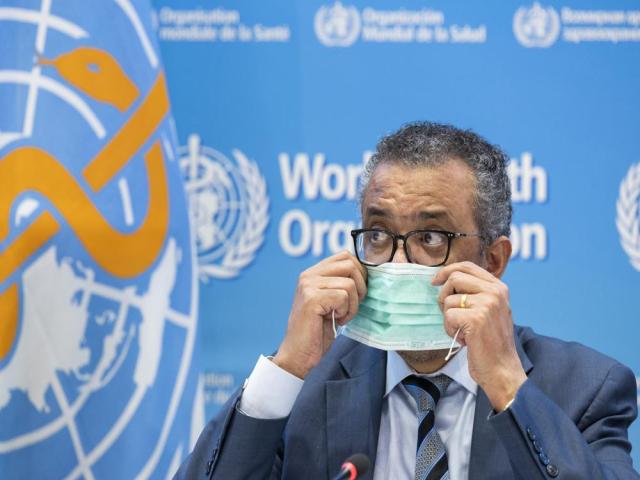WHO chief makes case for 2nd term as Ethiopia criticizes him

World Health Organization chief Tedros Adhanom Ghebreyesus laid out more plans Tuesday to fight the virus as he pitched his case for a new five-year term and faced criticism from his own country — Ethiopia — over his comments about the embattled Tigray region.
Tedros, who like many Ethiopians goes by his first name, is running unopposed for a second term as WHO director-general. That makes his presentation to the U.N. health agency’s executive board a bit of a formality, since he is all but certain to win re-election when the WHO Assembly takes place in May.
Recently, Tedros, an ethnic Tigrayan, has come under new criticism from Ethiopia’s government, which has been fighting militants in Tigray, for his comments on Twitter and elsewhere that condemned Ethiopia’s blockade of international access to Tigray. He said WHO had not been allowed to send any humanitarian aid to the region since July, and has called for “unfettered” humanitarian access to Tigray, whose people are facing enormous hunger amid the war.
Ethiopia’s government, in a Jan. 14 news release, said it had sent a letter to WHO accusing Tedros of “misconduct” after his sharp criticism of the war and the humanitarian crisis in the Horn of Africa country. The government nominated him for the job in 2017, but has since accused him of interfering in Ethiopia’s internal affairs, and claims he has “not lived up to the integrity and professional expectations required from his office.”
His current term as WHO’s top official — perhaps the highest-profile job in global health — has been overshadowed by the COVID-19 pandemic. Under Tedros, WHO faced sharp criticism from former U.S. President Donald Trump over its early handling of the crisis and has faced pressure over its approach to China, where the outbreak first emerged two years ago.
Last year, independent investigators turned up dozens of cases of sexual abuse and exploitation in Congo during a WHO-led response to an Ebola outbreak there in 2019.
Tedros said Tuesday he was “horrified” by those reports, saying the agency’s response to them has been “robust” and his commitment to preventing such exploitation, abuse and harassment “with a victim- and survivor-centered approach is iron clad.”
Many countries have ignored or rejected WHO advice on ways to tackle COVID-19, such as its calls to avoid blanket travel restrictions, or its calls to share vaccines and the technological know-how to make them with less developed nations.
On Monday, Ethiopian government spokesman Legesse Tulu said a WHO official had indicated it would postpone a decision to investigate Tedros.
“If this is the case, it really shows the partiality of WHO. It opposes its basic principles of foundation. We still insist on this esteem organization to investigate the case,” Tulu told The Associated Press.
Ethiopia’s ambassador in Geneva, Zenebe Kebede, sought to criticize Tedros for using his office to advance “his personal political interest” as the weeklong executive board session began on Monday. But he was interrupted by the chairman, who said the diplomatic complaint issued by Ethiopia had been set aside earlier by the board and was not up for discussion.
Kebede was given back the floor, resumed his statement, and was cut off again.
The Ethiopian diplomatic mission in Geneva issued a communique Tuesday saying “such mistreatment against a member country is unacceptable.” Its said its government was awaiting acknowledgement from WHO that it had received Ethiopia’s “formal complaint” about the alleged “misconduct” of Tedros.
Ethiopia claims Tedros is an active member of the Tigray People’s Liberation Front. Tedros was Ethiopia’s foreign minister and health minister when the TPLF dominated the country’s ruling coalition.
In his speech on Tuesday, Tedros didn’t refer to the complaints from Ethiopia’s government.
“Five years ago, you, the member states, gave me the honor of my life when you placed your trust in me to lead and transform this vitally important global organization,” he said. “I told you then that my priority was to listen. And that is what I have tried to do.”
“I remain completely committed to serving your member states and your people,” Tedros added.
COVID-19 antibody drugs from Regeneron and Eli Lilly should no longer be used because they don’t work against the omicron variant that now accounts for nearly all U.S. infections, U.S. health regulators said Monday.
The Food and Drug Administration said it was revoking emergency authorization for both drugs, which were purchased by the federal government and have been administered to millions of Americans with COVID-19. If the drugs prove effective against future variants, the FDA said it could reauthorize their use.
The regulatory move was expected because both drugmakers had said the infusion drugs are less able to target omicron due to its mutations. Still, the federal action could trigger pushback from some Republican governors who have continued promoting the drugs against the advice of health experts.
Omicron’s resistance to the two leading monoclonal antibody medicines has upended the treatment playbook for COVID-19 in recent weeks.
Doctors have alternate therapies to battle early COVID-19 cases, including two new antiviral pills from Pfizer and Merck, but both are in short supply. An antibody drug from GlaxoSmithKline that remains effective also is in short supply.
The drugs are laboratory-made versions of virus-blocking antibodies. They are intended to head off severe disease and death by supplying concentrated doses of one or two antibodies early in an infection. Then-President Donald Trump received Regeneron’s antibody combination after he tested positive for the coronavirus in 2020.
The FDA noted in its decision that omicron accounts for more than 99% of U.S. infections, making it “highly unlikely” the antibodies would help people now seeking treatment. The agency said restricting their use would also eliminate unnecessary drug side effects, including allergic reactions.
The U.S. government temporarily stopped distributing the two drugs in late December, as omicron was racing across the country to become the dominant variant. But officials resumed distribution after complaints from Republican governors, including Florida’s Ron DeSantis, who claimed that the drugs continued to help some omicron patients.
DeSantis has heavily promoted antibody drugs as a signature part of his administration’s COVID-19 response, setting up infusion sites and lauding them at news conferences, while opposing vaccine mandates and other public health measures. Texas Gov. Greg Abbott has also launched state-sponsored infusion sites.
The drugs are not a substitute for vaccination and are generally reserved for people who are the most vulnerable, including seniors, transplant recipients and those with conditions like heart disease and diabetes.
Since early January, the U.S. government has shipped enough doses of the two antibodies to treat more than 300,000 patients.
Both Regeneron and Lilly previously announced they were developing new antibodies that target omicron.

Top 10 Yoga Asana For Normal Delivery
- It is often found that normal delivery is more beneficial for both you and your baby than a Cesarean.

Fenugreek Seeds Characteristics And Amazing Uses For Everyone
- The use of fenugreek for medicinal purposes is noted in the documents of Ancient Egypt.

The Best Yoga Poses for Advance Yogis
- Here in this article we will discuss some advanced yoga poses that are available to yogis who have made this their life.

Health Benefits of Boat Pose or Naukasana
- Yoga is proved to be beneficial not only for your mental well-being but also your whole health.